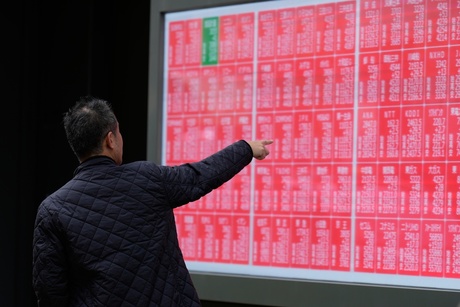US futures jump after Trump says he expects trade deal with China

Wall Street is poised to add to last week's records when markets open Monday after President Donald Trump said he expected to reach a trade agreement with China.
Futures for the S&P 500 jumped 0.9% while futures for the Dow Jones Industrial Average gained 0.5%. Nasdaq futures, boosted by chipmakers, were up 1.3%. Nvidia was up 2.5% while Micron jumped 4.1%.
Aside from Trump's meeting with Chinese leader Xi Jinping, markets will be focused on another heavy slate of corporate earnings this week, as well as what's expected to be another quarter-point interest rate cut from the Federal Reserve on Wednesday.
Google, Meta, Microsoft, Apple and Amazon all report their latest quarterly results this week.
Keurig Dr Pepper gained 3.7% after the beverage company topped Wall Street's third-quarter profit forecasts and issued strong guidance.
Work on trade deals that might alleviate friction between the U.S., China and other major trading partners has reassured investors, especially in Asia.
Japan's benchmark Nikkei 225 gained 2.5% to 50,512.32, a new closing high following news that the world's two largest economies had reached an initial consensus for Trump and Chinese leader Xi Jinping to finalize during a high-stakes meeting later in the week.
"I have a lot of respect for President Xi," Trump told reporters after visiting Malaysia for a summit of Southeast Asian nations, where he reached preliminary trade agreements with Malaysia, Thailand, Cambodia and Vietnam.
"I think we're going to come away with a deal," Trump said.
Chinese markets logged solid gains. Hong Kong's Hang Seng rose 1.1% to 26,434.69, while the Shanghai Composite index added 1.2% to 3,996.94.
"This isn't just photo-op diplomacy. Behind the showmanship, Washington and Beijing's top trade lieutenants have quietly mapped out a framework that might, just might, keep the world's two largest economies from tearing up the field again," Stephen Innes of SPI Asset Management said in a commentary.
Trump traveled to Japan on Monday and will end his Asian tour in South Korea, where he is expected to meet with Xi on the sidelines of a Pacific Rim summit, the Asia-Pacific Economic Cooperation (known as APEC) forum.
Opinion polls show Japan's newly installed Prime Minister Sanae Takaichi enjoys high levels of public support for her market-friendly policies and apparent strong performance in her debut at the regional summit. Japan's first female prime minister, Takaichi favors raising defense spending. That has boosted prices of stocks in major defense contractors, such as Kawasaki Heavy Industries, which gained 9%. IHI Corp. jumped 2.8% and Hitachi gained 3.7%.
Trump has long complained American cars were shut out Japanese markets, one of various reasons he cited for imposing tariffs of 25%, then lowered to 15%, on American's most vital ally in Asia. So as part of its negotiations with Washington, Japan's government has floated the idea of buying a fleet of Ford F-150 trucks to use to inspect roads and infrastructure.
In South Korea, the Kospi gained 2.6% to 4,042.83, also a record. Investors there are hoping for a trade deal with Trump. Australia's S&P/ASX 200 picked up 0.4% to 9,055.60.
Taiwan's Taiex gained 1.7% and the Sensex in India was up 0.7%.
Despite the positive talk about trade agreements, a report by the APEC secretariat released Monday forecast that annual growth in the region circling the Pacific will slow to 3% this year from 3.6% last year, partly due to trade restrictions and higher tariffs.
In Europe at midday, Germany's DAX and the CAC 40 in Paris each ticked up 0.1%, while Britain's FTSE 100 was unchanged.
On Friday, U.S. stocks hit records after an update on inflation came in a bit less painful than feared.
The inflation data was encouraging because it could mean less pain for lower- and middle-income households struggling with still-high increases in prices. Even more importantly for Wall Street, it could also clear the way for the Federal Reserve to keep cutting interest rates in hopes of giving a boost to the slowing job market.
In energy trading, U.S. benchmark crude oil gave up early gains, falling 38 cents to $61.12 per barrel. Brent crude, the international standard, declined 37 cents to $64.83 per barrel.
Oil prices have eased settled after climbing nearly 8% last week when the U.S. and European Union ratcheted up sanctions on Russian oil in an attempt to get Russian President Vladimir Putin to the bargaining table over its yearslong war on Ukraine.



